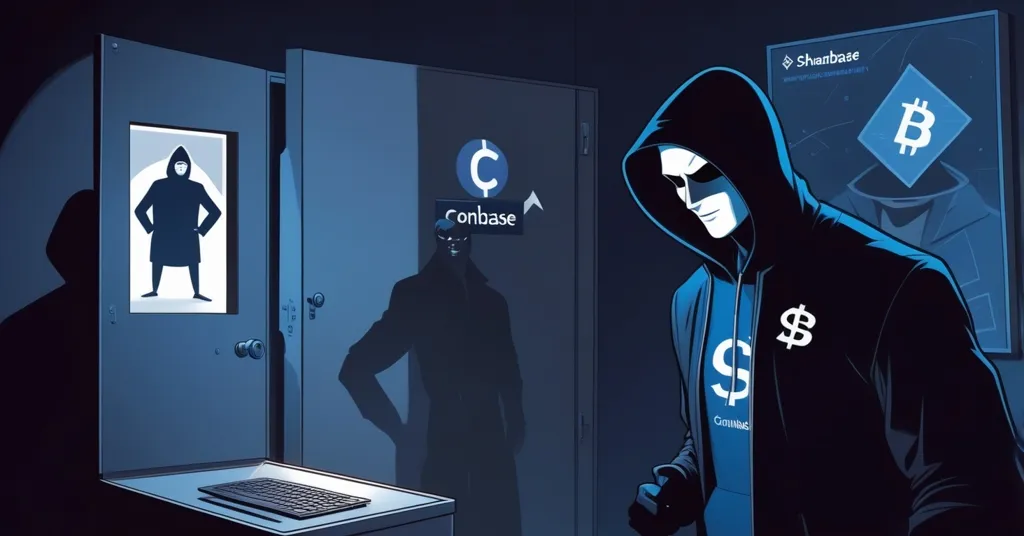US DOJ Investigates Coinbase After $20M Hack: Bribery and Data Breach Uncovered

US Justice Department Probes Coinbase Over $20 Million Ransom Hack
In a shocking turn of events, Coinbase, the largest cryptocurrency exchange in the US, faces a $20 million ransom demand following a sophisticated hack. The U.S. Justice Department is now delving deep into this significant security breach, which was facilitated by bribing overseas Coinbase employees and contractors. This incident has not only compromised customer data but also exposed the personal information of high-profile figures like Roelof Botha from Sequoia Capital, just as Coinbase was poised to join the S&P 500 index.
- Hackers bribed overseas Coinbase employees to steal customer data.
- Timing critical as Coinbase was set to join the S&P 500.
- Coinbase’s proactive response includes cooperation with DOJ and a $20 million reward fund.
The breach was carried out using social engineering, a tactic where hackers manipulate individuals into divulging confidential information. In this case, they targeted employees and contractors based in India, bribing them to steal customer data. This method of attack underscores the vulnerability of even the most prominent players in the crypto space to insider threats and social engineering tactics.
Among those affected by the data breach is Roelof Botha, the managing partner at Sequoia Capital, highlighting how even high-profile individuals are not immune to such cyber threats. Coinbase has responded swiftly, notifying and cooperating with the DOJ and other law enforcement agencies. Paul Grewal, Coinbase’s chief legal officer, emphasized their commitment to pursuing criminal charges against the attackers, stating,
“We have notified and are working with the DOJ and other US and international law enforcement agencies and welcome law enforcement’s pursuit of criminal charges against these bad actors.”
Instead of succumbing to the ransom demand, Coinbase has set up a $20 million reward fund for information leading to the arrest and conviction of the hackers. This move is a clear signal of their refusal to pay the ransom and their determination to bring the perpetrators to justice. However, the estimated costs to resolve the breach could reach up to $400 million, a significant financial burden for the company. Coinbase’s stock initially surged by 20% upon the announcement of its inclusion in the S&P 500, but it later dropped more than 7% following the breach news, reflecting the volatile nature of stock responses to such incidents.
While Coinbase has been proactive in its response, some industry analysts argue that the $20 million reward fund might not be the most effective use of resources compared to directly enhancing security measures. This criticism raises questions about the best strategies for preventing future breaches and protecting customer data. Despite this setback, Coinbase remains a leader in the crypto space, and this incident could push them to pioneer new security standards, setting a positive example for the industry.
The breach’s timing is particularly significant as it coincides with Coinbase CEO Brian Armstrong’s efforts in Washington, DC, to push for crypto-related legislation. This includes upcoming votes on stablecoin and digital asset market structure bills that could significantly impact the regulatory landscape for exchanges like Coinbase. The incident underscores the need for robust cybersecurity measures as the crypto industry continues to integrate into traditional financial markets.
Beyond Coinbase, the crypto industry faces similar threats, with reports of similar attacks on users at Kraken and Binance. This suggests a broader issue that demands collective action and enhanced security protocols across the board. Coinbase has advised its users to enable withdrawal whitelisting—a measure to limit withdrawals to pre-approved addresses—and to remain cautious of unsolicited communications to protect themselves from potential scams and phishing attempts.
As the crypto world continues to evolve, incidents like these serve as a reminder that while the potential for decentralization and financial freedom is immense, the road is fraught with challenges that demand constant vigilance and innovation. Coinbase’s response to this breach exemplifies the proactive approach needed to navigate the turbulent waters of the crypto industry. Despite the hackers’ audacity, Coinbase’s refusal to pay the ransom and their commitment to enhancing security measures reflect their dedication to maintaining trust and security in the crypto ecosystem.
Key Questions and Takeaways
What was the nature of the security breach at Coinbase?
Hackers bribed overseas employees to steal customer data, then demanded a $20 million ransom.
How is Coinbase responding to the breach?
Coinbase is cooperating with the U.S. Justice Department and other law enforcement agencies, and has dismissed the involved employees.
Who was affected by the data breach?
Customer data was stolen, including personal information of high-profile individuals like Roelof Botha.
What are the potential financial implications for Coinbase?
The company estimates that the breach could cost up to $400 million to resolve.
What is the significance of the timing of the breach?
The breach occurred just before Coinbase was set to join the S&P 500, a major milestone for the company and the crypto industry.
How does this breach impact the broader crypto industry?
Similar attacks on users at Kraken and Binance indicate a broader industry issue that demands collective action for enhanced security protocols.
What legislative developments are relevant to this situation?
Upcoming votes on stablecoin and digital asset market structure bills could reshape the regulatory landscape for exchanges like Coinbase.
What are the criticisms of Coinbase’s response to the breach?
Some argue that the $20 million reward fund might not be the most effective use of resources compared to directly enhancing security measures.
Can Coinbase recover and pioneer new security standards?
Despite the setback, Coinbase’s proactive approach could set a positive example and lead to pioneering new security standards in the industry.



